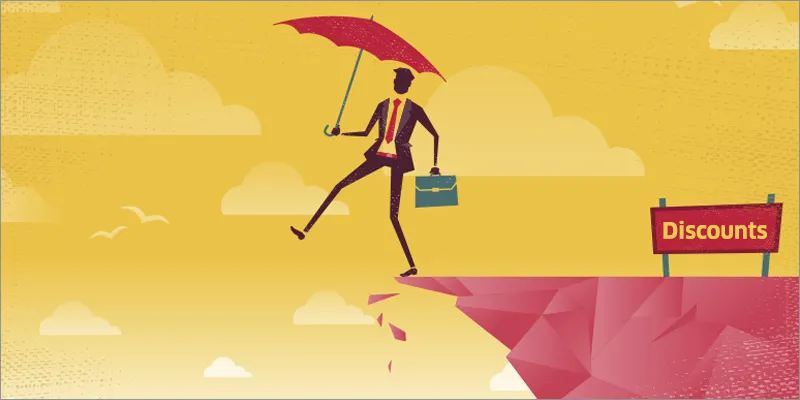Discounts by e-commerce: is it slow poison?
As a customer, do you keep hearing and seeing these words from your favourite brands: discounts, sale, ‘flat Rs X off’, ‘last 10 hours’, ‘rush hour sale’, cashback, ‘weekend damaka’, ’buy 1, get 1’etc?
As a company, do you hate seeing those words? Welcome to the new world of "running" companies in a mad rat race.
The last 12-18 months specifically has spoiled the economics of business in India. The blame has to be equally spread across all consumer-facing verticals such as retail, travel, food and health.

Consumers love discounts; companies hate to give them. There was a give-and-take equation (seasonal discounts) that existed a year ago. But, now, from a company’s perspective, the equation seems just to give, but not to take.
Irrespective of whether it is a commodity-based business or a service-based business, discounting seems to rule.
Topline seems to grow for a majority of companies, but how many of them talk about the bottomline (read loss, perhaps)? Are we living in an age where giving discounts is the only way to attract customers?
Myths of giving discounts: ("I" = a company)
a) I will acquire more customers
b) The topline will skyrocket, so I can show an attractive Gross Merchandise Volume to investors (if I have one)
c) I will make the small competitors (read: startups) go out of business very soon, because they can't afford to bleed money like me
d) Customers will be loyal to my brand as they get constant discounts
e) I am disrupting this space
f) I am about to get funded; I have to attract investors by showing numbers, let me make more noise by offering deeper discounts
Reality of giving discounts: ("You" = a company)
a) There is actually zero loyalty. Assume Brand A offers a product at Rs 390 (after discount) and a customer has bought this product six times in last few months from this brand. Today, Brand B offers the same product at Rs 375, the loyalty immediately changes to Brand B. Period.
To quote a personal example, I would have taken about 350 rides in Uber till now. But, the day Ola decides to drop rates below Uber, then no brownie points to guess the app I will choose for my next ride.
b) You aren't disrupting the space; rather you are rupturing the space. A business cannot be built on price or discount strategy. Unless a company is printing money, giving discounts is not sustainable. The honeymoon will end soon.
c) Loss mounts, or you extend the timeline to become profitable. Neither you grow, nor do your competitors. Rather, only the customer wallet grows when you tend to measure the wrong KPI/metrics.
d) When you reach a point where your remaining bank balance is sufficient only to pay salaries for three to four months, everything in the company topples. Panic sets in, from the top to bottom. But the effect will start from the bottom of the pyramid (read: layoff) to the top.
e) Practically, no customer acquisition is happening. Customers take advantage of the situation, and move on to the next brand that offers low rates.
Instead of a brand taking on another brand innovation and hard work, it takes on a war by offering discounts.
Teams are deployed internally to brainstorm and come up with creative ideas to offer discounts. Teams are forced to find an opportunity to reach out to customers to offer discounts. Rewind your mind to August 15 and try to recall the various creative discounting campaigns that brands ran.
The current market is spoilt. Customers are trained to hunt for and enter a ‘promo code’. The term has literally lost its meaning: what was supposed to be a ‘promo’ has gone mainstream and staying as an integral part of a product pricing/strategy.
Customers are now tuned to see a product display price by discounting the offer price. If a brand has displayed a product at Rs 2,000, customers tend to involuntarily read the price as Rs 1,400, because they know the brand gives 30 per cent discount always.
In the near future, I think companies are going to pay customers for them to buy a product (that will also be funded by companies) from the brand. In the industry that I currently work – m-commerce for hotel industry - I wouldn't be surprised if a brand pays Rs 500 to a customer to go and stay in a hotel where the room is also booked and paid for by the brand. It is going to be a long and difficult journey to un-train customers from entering promo codes, and making them pay full price for a product.
You have a great team? Great product? Great strategy? Great traction? Great CPI? Great repeat customers? All of these don’t matter. It looks like what matters in the current market is the bank balance of the company and how much you can afford to give discounts.
To top it all, there are companies that aggregate promo or discount coupons from various companies and offer it to customers. This makes one wonder how many entrepreneurs and their good ideas are getting killed due to the turbulence created by cash-rich, discount-affordable companies.
Similar to an MRP for a product, how I wish there is an another ‘MRP’, just that it should be called ‘Minimum Retail Price’. For service-oriented businesses like travel, health care and food delivery, neither MRPs are available.
I wish some sanity kicks in and companies gradually cut down discounting before customers take a tiny needle and bursts the bubble.
(Disclaimer: The views and opinions expressed in this article are those of the author and do not necessarily reflect the views of YourStory)
Related read: Rooms Tonite aims to be the Tatkal IRCTC for hotel bookings
YS Research: Making sense of Flipkart’s and Snapdeal’s valuations through their GMV







